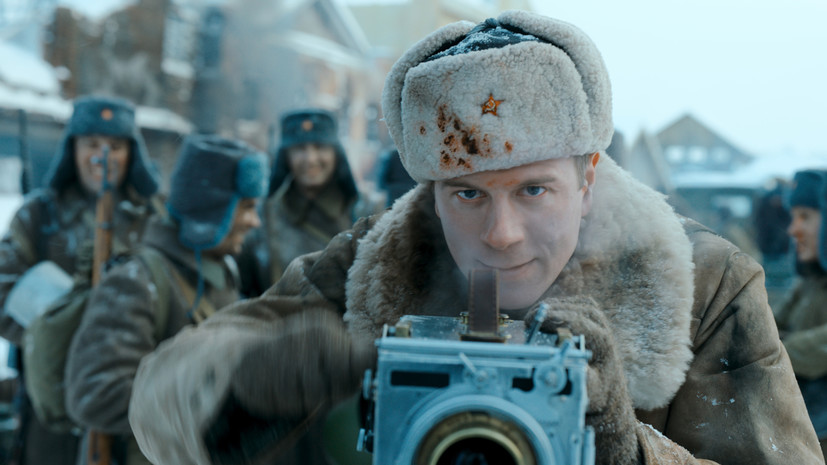"First Oscar"
The historical drama The First Oscar tells how filmmakers worked during the Great Patriotic War.
The action takes place in 1941, in the center of the plot are students of VGIK Ivan (Tikhon Zhiznevsky) and Lev (Anton Momot).
They go to the front as cameramen and shoot materials for a documentary.
The characters are fictitious, but the plot is inspired by the story of directors Leonid Varlamov and Ilya Kopalin, whose film The Defeat of German Troops near Moscow was awarded an Oscar in 1943.
As Alexander Kibovsky, head of the Moscow Department of Culture, noted, “The First Oscar” is “not just a story about a military drama, it is a story about people of art, through whose eyes we can now see the events of that time.”
The director was Sergei Mokritsky, who previously directed the film "Battle for Sevastopol".
Maxim Budarin (The Battle for Sevastopol, Devyatayev) and Yuri Nenev (I Love Him Too) worked on the script.
They focused on such tapes as "In War as in War", "Come and See", "They Fought for the Motherland" and "The Defeat of German Troops near Moscow".
Another source was the book "The Price of a Frame", which contains letters and various documents from front-line operators.
"Tear it off and throw it away"
Kirill Sokolov, screenwriter and director of the 2018 tape "Daddy, die" is releasing a new black comedy.
The main role is played by Anna Mikhalkova.
Also in the film are Victoria Korotkova (“Under Electric Clouds”), Alexander Yatsenko (“Arrhythmia”, “Streltsov”), Vitaly Khaev (“Kalashnikov”, “Salyut-7”) and other actors.
In the center of the plot is Vera Pavlovna (Mikhalkova).
She was engaged in raising her granddaughter Masha, while her daughter Olga (Korotkova) was in prison - the girl gouged out her lover's eye.
Having been released, Olga decides to take her daughter, but the grandmother does not want to part with her granddaughter.
Then the heroine Korotkova kidnaps the girl and goes on the run, but the armed Vera Pavlovna starts the chase.
Despite the dramatic plot and specific humor, the film has a deep social subtext and an encouraging idea.
“But still, how bright you will see this story depends on your personal attitude.
Even the ending here can be interpreted as happy or, on the contrary, look at it more critically, in a more pessimistic way, ”the director said in an interview with the ProfiCinema portal.
He added that "Tear and Throw" is "a movie about how hard it is to correct the mistakes of the past, to forgive or let go, especially when you are an adult.
And therefore, the only hope for the heroes is their child, their girl, with her childish spontaneity, flexibility, her faith in something good.
"Execution"
Lado Kvatania is primarily known as a music video director.
He shot music videos for such artists as Husky, Manizha, the Leningrad group, Dolphin.
The psychological thriller Execution is his feature directorial debut.
According to the plot, in the case of the investigation of a series of murders, which lasted ten years and was closed, a new circumstance appears: one of the victims of the criminal, it turns out, is alive.
Investigator Issa Davydov, because of whom the innocent were previously convicted, will try to correct his mistake and seek justice.
“This film is a reflection of my personal experiences and problems.
Not only mine, it seems to me, but also the reality in which we all exist,” says Kvatania.
The main role was played by Niko Tavadze ("Nothing happens twice").
Also, the stars of Russian cinema are involved in the tape: Yulia Snigir, Daniil Spivakovsky, Victoria Tolstoganova, Aglaya Tarasova.
"This new world" (La croisade)
The famous French actor Louis Garrel in the comedy "This New World" plays one of the central roles, and also acts as a director and screenwriter (in collaboration with Jean-Claude Carrière).
His wife was played by the wife of the artist Letizia Casta.
In the story, their on-screen teenage son suddenly starts selling valuables.
It turns out that he sends all the money to support a project aimed at stopping climate change and saving the world from an environmental disaster.
According to Cineuropa contributor Julia Olmo, This New World reflects "an idealism and anguish" that modern people "owe a lot to the previous generation."
“One of his strengths is understanding how to tell a story and connect all these diverse feelings: the endless possibilities available to new generations, and trying to answer the question of why this idealism disappears over time,” says Olmo.
The film critic writes that, as a result, the film is transformed into an emotional fable, in which the question is raised: is the life that people have accepted really what they want?

